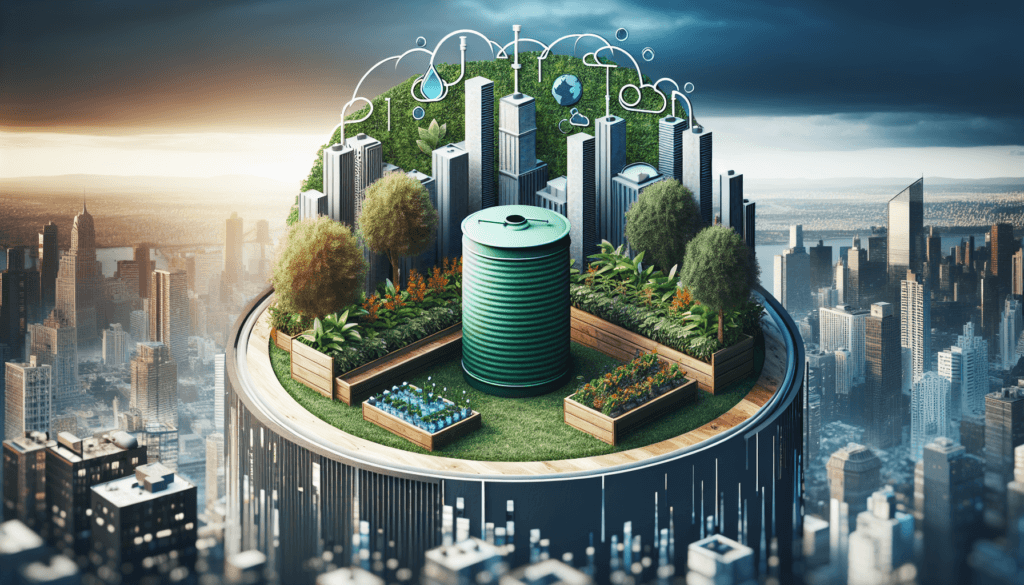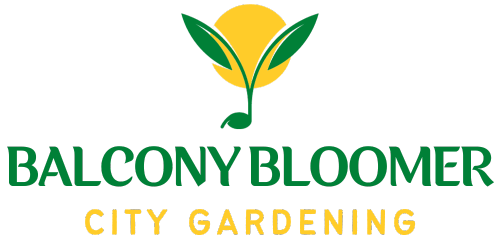Imagine having a lush and thriving garden right in the heart of the city, where concrete buildings and pollution surround you. With the increasing concerns over water scarcity and environmental sustainability, rainwater harvesting has emerged as a game-changer for urban gardeners. This innovative practice not only helps to conserve water, but it also offers a range of benefits that can transform your garden into a haven of greenery and beauty. From reducing your water bill to providing healthier plants and contributing to a greener environment, rainwater harvesting is a simple yet effective solution that every urban gardener should consider. Say goodbye to dry soil and welcome the abundance of nature with this eco-friendly approach.

Increasing Water Availability
Reducing Reliance on Municipal Water Supply
By implementing rainwater harvesting systems in your urban garden, you can significantly reduce your reliance on municipal water supply. Instead of solely depending on the availability of treated water from the local water utility, you can harness the power of rainwater to meet your watering needs. This not only ensures a more reliable water supply but also helps to alleviate the burden on municipal resources, particularly during times of high water demand.
Ensuring Water Supply During Droughts
During droughts or periods of water scarcity, having a rainwater harvesting system in place becomes even more crucial. While municipal water supply may become limited or restricted, rainwater harvesting allows you to tap into a secure and sustainable water source. By collecting and storing rainwater during wet seasons, you can ensure that your garden and plants continue to receive the water they need, even in times of drought.
Sustaining Water Reserves for the Future
With increasing concerns about water scarcity and the depletion of freshwater sources, it is essential to sustain water reserves for the future. Rainwater harvesting helps in preserving water resources by capturing rainfall that would otherwise go to waste and redirecting it for future use. By doing so, you not only contribute to the conservation of this valuable natural resource but also set an example for others in your community to follow.
Cost Savings
Lowering Water Bills
One of the significant advantages of rainwater harvesting is the potential for cost savings. By utilizing rainwater to meet your irrigation needs, you can reduce your reliance on municipal water supply, resulting in lower water bills. Instead of paying for treated water from the utility, you can use the free and abundant rainwater that falls on your property. Over time, these savings can add up, making rainwater harvesting a financially sensible option for any urban gardener.
Mitigating the Cost of Irrigation Systems
In addition to lowering water bills, rainwater harvesting can help mitigate the cost of irrigation systems. Traditional irrigation systems often require costly infrastructure and equipment. However, by collecting and utilizing rainwater, you can reduce the need for such elaborate systems. Rainwater can be directly used for watering plants or easily integrated into existing irrigation systems, minimizing the need for additional equipment and ultimately saving you money.
Reducing Energy Consumption
Another hidden advantage of rainwater harvesting is the potential to reduce energy consumption. Municipal water supply involves extensive energy usage, including pumping, treatment, and distribution. By reducing reliance on the municipal water supply through rainwater harvesting, you indirectly contribute to energy savings. Additionally, since rainwater is readily available on your property, there is no need for energy-intensive pumping systems, resulting in further energy conservation and environmental benefits.
Environmental Benefits
Conserving Freshwater Resources
Freshwater resources are finite and must be conserved to ensure a sustainable future. Rainwater harvesting plays a crucial role in freshwater conservation by reducing the strain on these limited resources. By collecting and using rainwater, you decrease the demand for freshwater from lakes, rivers, and underground aquifers. This helps to preserve these valuable resources, ensuring their availability for ecosystems, wildlife, and future generations.
Minimizing Stormwater Runoff and Erosion
Urban areas are prone to increased stormwater runoff due to the impermeable surfaces such as concrete and asphalt. This excess runoff can lead to erosion, flooding, and water pollution. However, by incorporating rainwater harvesting systems in urban gardens, you can help minimize the negative effects of stormwater runoff. Capturing rainwater prevents excessive runoff, allowing it to be utilized instead of being wasted. This reduces erosion and the associated risks of flooding, safeguarding your garden and surrounding areas.
Promoting Biodiversity
Rainwater harvesting can have a positive impact on biodiversity in urban environments. By capturing and using rainwater, you create more sustainable habitats for plants and wildlife. With a stable and reliable water supply, you can cultivate a diverse range of plant species that attract pollinators and support ecosystem health. This, in turn, encourages biodiversity by providing food, shelter, and breeding grounds for a variety of beneficial insects, birds, and animals.
Improved Plant Health and Growth
Eliminating Chlorine and Chemicals in Tap Water
Tap water often contains chlorine and other chemicals that can be detrimental to the health of your plants. By using rainwater in your urban garden, you can eliminate the potential harm caused by these substances. Rainwater is free from chlorine and chemical additives, providing your plants with a purer and more natural source of hydration. This promotes healthier plant growth, prevents leaf burn, and reduces the risk of soil contamination over time.
Providing Nutrient-Filled Rainwater
Rainwater is not only free from harmful chemicals but also rich in essential nutrients that your plants need to thrive. As rainwater falls through the atmosphere, it absorbs trace amounts of minerals and nutrients. When you water your garden with rainwater, you’re providing your plants with these natural and readily available nutrients. This promotes stronger root systems, vibrant foliage, and overall improved plant health.
Enhancing Soil Moisture and Aeration
Maintaining optimal soil moisture levels is crucial for plant growth, but overwatering or underwatering can be challenging to achieve. However, by utilizing rainwater, you can better control soil moisture levels in your urban garden. Rainwater has a balanced pH level and is easily absorbed by the soil, promoting optimal plant hydration. Additionally, rainwater infiltrates the soil more effectively, improving aeration and preventing soil compaction, which is essential for root development and nutrient uptake.

Reduced Flooding Risks
Managing Excess Rainfall
Excess rainfall can lead to flooding, causing damage to properties and infrastructure. Utilizing rainwater harvesting can help you manage excess rainfall effectively and reduce the risks of flooding in your urban garden. By capturing rainwater, you prevent it from overwhelming drainage systems and redirect it to storage tanks or permeable surfaces. This reduces the volume of water reaching storm drains, mitigating the risk of flooding and protecting your garden from water damage.
Alleviating Strain on Drainage Systems
In urban areas, the drainage systems are often designed to accommodate the average rainfall patterns. However, extreme weather events and heavy precipitation can overwhelm these systems, leading to localized flooding. Rainwater harvesting helps alleviate the strain on drainage systems during such events by reducing the volume of water entering the storm drains. By capturing and retaining rainwater on your property, you are effectively helping to prevent flooding in your surrounding neighborhood.
Preventing Waterlogging in Gardens
Waterlogging occurs when soil becomes saturated and unable to drain excess water. This can be detrimental to plant health as it deprives the roots of oxygen, leading to root rot and nutrient deficiencies. Rainwater harvesting can mitigate the risk of waterlogging in your urban garden by capturing rainwater before it saturates the soil. You can then use this collected rainwater for irrigation at a controlled rate, ensuring proper drainage and preventing the negative effects of waterlogging on your plants.
Flexibility in Watering Schedules
Adapting to Variable Rainfall Patterns
Rainfall patterns can be unpredictable, with some years experiencing periods of drought and others receiving excessive rainfall. By implementing a rainwater harvesting system, you can adapt to these variable rainfall patterns and ensure a reliable water supply for your urban garden. During periods of low rainfall, you can rely on the stored rainwater to meet your watering needs. Conversely, during times of heavy rainfall, you can capture and store the excess water for later use. This flexibility gives you the ability to maintain healthy plants regardless of the fluctuating weather conditions.
Customizing Irrigation for Different Plant Needs
Different plants have varying water requirements, and customizing your irrigation practices accordingly can be challenging with traditional water sources. However, rainwater harvesting allows you to address the specific water needs of your plants more precisely. You can easily adjust your watering schedule and methods based on the types of plants you have and their varying requirements. This targeted approach ensures that each plant receives an adequate amount of water, promoting optimal growth and reducing the risk of over or underwatering.
Reducing the Risk of Under or Overwatering
Achieving the right balance of water for your plants is crucial for their health and growth. Underwatering can lead to stunted growth and nutrient deficiencies, while overwatering can suffocate the roots and promote the growth of harmful plant diseases. By utilizing rainwater in your urban garden, you can reduce the risk of under or overwatering. Rainwater has a balanced pH level and is naturally suited for plant hydration, allowing you to provide your plants with the ideal amount of water for optimal health and growth.

Educational Opportunities
Teaching Sustainable Practices
Rainwater harvesting in urban gardens presents excellent educational opportunities, especially for children and community members. By demonstrating the benefits and techniques of rainwater harvesting, you can teach sustainable practices that promote responsible water use. This hands-on approach helps individuals understand the importance of conserving water, fostering a sense of environmental stewardship and encouraging them to implement rainwater harvesting in their own homes and communities.
Promoting Environmental Awareness
Implementing rainwater harvesting systems in urban gardens serves as a powerful way to promote environmental awareness. By showing how rainwater can be harnessed and utilized effectively, you raise awareness about the importance of water conservation and sustainable living. This increased awareness can inspire others to think critically about their own water usage and take steps towards a more environmentally-conscious lifestyle overall.
Engaging Communities in Gardening Activities
Rainwater harvesting is not only about sustainable water practices but also about fostering community engagement. By organizing gardening activities and workshops centered around rainwater harvesting, you can bring together people from different backgrounds, ages, and interests. These communal efforts not only create vibrant and inclusive spaces but also enable individuals to learn from one another, build relationships, and strengthen community bonds. Gardening together also instills a sense of pride, ownership, and shared responsibility for the environment.
Reduced Water Pollution
Preventing Contamination of Rivers and Lakes
Rainwater harvesting plays a significant role in preventing water pollution by reducing the discharge of pollutants into rivers and lakes. When rainwater runs off surfaces such as roofs, roads, and sidewalks, it accumulates pollutants like chemicals, oils, and debris. By capturing and collecting rainwater, you prevent these contaminants from entering natural water bodies. This not only safeguards the health of aquatic ecosystems but also protects the quality of water sources that serve as habitats for wildlife and sources of drinking water.
Minimizing Pesticide and Fertilizer Runoff
In traditional gardening practices, pesticides and fertilizers can often wash away during heavy rain, contributing to water pollution. With rainwater harvesting, you can minimize the risks of pesticide and fertilizer runoff. By using rainwater for irrigation, the need for synthetic fertilizers can be reduced. Additionally, rainwater naturally dilutes any necessary pesticides applied to the plants, preventing concentrated runoff and limiting their impact on the environment. This ensures the health and safety of surrounding water sources and minimizes the negative effects on aquatic life.
Preserving Aquatic Ecosystems
Rainwater harvesting is an integral part of preserving and protecting aquatic ecosystems. By capturing and utilizing rainwater in your urban garden, you promote the conservation of water resources and protect natural ecosystems. By reducing the demand for freshwater from natural sources, you help maintain the delicate balance of aquatic ecosystems. This is particularly crucial in urban areas where the rapid development and expansion can put significant pressure on local water sources and pose risks to the overall health and biodiversity of aquatic ecosystems.

Aesthetic and Recreational Value
Creating Serene Garden Spaces
Rainwater harvesting not only provides practical benefits but also adds aesthetic value to your urban garden. Collecting rainwater in visually appealing containers or rain barrels can serve as focal points within the garden. These features not only create a serene and calming ambiance but also enhance the overall visual appeal of your space. Additionally, the sound of rainwater trickling into your collection system can create a soothing atmosphere, allowing you to fully enjoy the tranquility of your garden.
Enhancing the Beauty of Urban Environments
Implementing rainwater harvesting systems in urban gardens contributes to the overall beauty and charm of the surrounding environment. By creating lush green spaces and vibrant plant life, you can enhance the aesthetics of your neighborhood. The visual impact of a well-designed urban garden is not only eye-catching but can also inspire others to incorporate similar practices to improve the overall aesthetic of their urban environments. By transforming urban spaces into pockets of greenery, you create a more visually appealing and inviting atmosphere for both residents and visitors.
Providing Opportunities for Outdoor Activities
Rainwater harvesting in urban gardens offers numerous opportunities for outdoor activities and recreational enjoyment. By creating a functional and sustainable garden space, you can engage in various activities such as gardening, planting, and landscaping. These outdoor activities not only provide physical exercise and stress relief but also offer opportunities to connect with nature. Additionally, rainwater harvesting systems can be integrated into outdoor features like ponds or fountains, providing a refreshing and inviting space for gathering, relaxation, and socializing.
Contributing to Sustainable Development Goals
Supporting Goal 6: Clean Water and Sanitation
Rainwater harvesting aligns with the Sustainable Development Goal (SDG) 6 of ensuring clean water and sanitation for all. By capturing and utilizing rainwater, you reduce the strain on freshwater sources and promote responsible water use. This contributes to the conservation of clean water by minimizing the demand for treated water from municipal supplies. By implementing rainwater harvesting in your urban garden, you actively contribute to SDG 6, helping to create a more sustainable and water-scarcity-resilient future.
Promoting Goal 11: Sustainable Cities and Communities
Rainwater harvesting systems in urban gardens play a vital role in promoting sustainable cities and communities. By reducing the reliance on municipal water supply and conserving natural resources, rainwater harvesting contributes to a more sustainable and resilient urban environment. The implementation of rainwater harvesting in urban gardens fosters community engagement, stimulates environmental awareness, and encourages responsible water practices. These efforts align with SDG 11, which aims to make cities and human settlements inclusive, safe, resilient, and sustainable.
Addressing Goal 13: Climate Action
Addressing climate change is a global priority, and rainwater harvesting is a practical step towards climate action. By conserving water and reducing energy consumption, rainwater harvesting systems help to mitigate the impacts of climate change. Water scarcity and the increased frequency of extreme weather events are some of the challenges posed by climate change, and rainwater harvesting provides a localized solution. By adopting rainwater harvesting practices in your urban garden, you contribute to SDG 13 by actively working towards climate resilience and sustainable water management.



